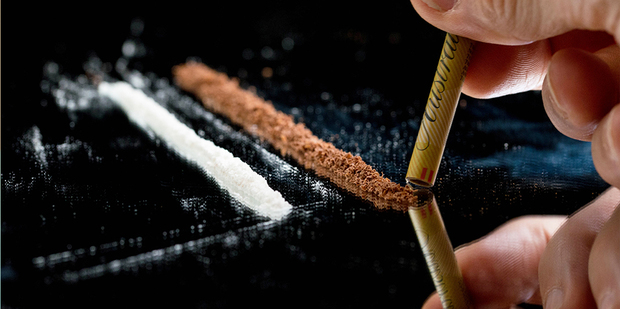By: Jeff Dionot
Foods laden with sugar are considered some of the most addictive meals of them all. When asking people if they have a hankering for a certain selection of dishes, they most commonly answer that they have a sweet-tooth; they often crave and relapse back into a sugary diet – two behaviors that are critical components of addiction according to Bart Hoebel of Princeton University. The reason for this is that sugar can be as habit-forming (and as harmful in the long-run) as drugs of abuse – specifically cocaine.
Dr. David Reuben, author of Everything You Always Wanted to Know About Nutrition says, “White refined sugar is not a food. It is a pure chemical extracted from plant sources, purer in fact than cocaine, which it resembles in many ways. It’s true name is sucrose and its chemical formula is C12H22O11. The chemical formula for cocaine is C17H21NO4… For all practical purposes, the difference is that sugar is missing the ‘N’, or nitrogen atom.”
Besides the chemical composition of the two, sugar and cocaine share numerous similarities. Both have comparable appearances, both give consumers similar effects, and both are incredibly lucrative to their respective producers and distributors. In terms of effects, sugar and cocaine boost dopamine levels for the recipient. Increased dopamine in the body causes higher alertness, focus, happiness, and motivation. The highest levels of dopamine may lead to mania and delusions. Long-term consumption of both sugar and cocaine results in an overall reduction of dopamine levels, forcing people to consume larger quantities in order to get the same heightened rush.
In terms of finances, the approximate 2018/2019 production of sugar amounted to 179.66 million metric tons. With an average price point of $400 per metric ton, which equates to roughly $71.86 trillion. In 2017, the total global production of 100 percent pure cocaine was only 1,976 tons, but with an aggregate price point of $1 million per metric ton, that results in $1.97 trillion dollars. Big Sugar and drug traffickers also meddle with their products throughout the supply chain in order to save costs and increase sales. Big Sugar might add additional chemicals to sugar to make artificial sweeteners such as Splenda. Drug traffickers almost always set aside some cocaine to dilute or “cut” it with other white powders (laundry detergents, laxatives, etc.), thus increasing weight and profit.
The overall proceeds of sugar dwarfs those of cocaine because of its legality. A cocaine addict usually gets hooked on their illicit substance when they are past adolescence and manage to find a local dealer; a sugar addict may start their dependency as early as early childhood when one too many candies kickstarts their lifelong cravings. There are multiple hurdles to overcome in order to purchase even a gram of cocaine, but the only thing stopping a five-year-old from purchasing a party bag of chocolates is a twenty dollar bill.
While the issues of addiction are placed more heavily on cocaine, sugar addiction is a much more pertinent, grounded, and widespread problem. Chasing that dopamine is never a worthwhile pursuit. Since there aren’t exactly rehabilitation centers for people with a sugar dependency, the goal of abstinence falls on their shoulders. They themselves have to abandon their habitual cravings if they want to return to baseline normalcy. Recognizing that a problem exists is almost always the first step, followed by abstinence.
For example, take a look at Christine from Freaky Eaters. After a divorce that distanced herself from her husband and children, she resorted to sugar in order to cope with newfound depression and isolation; according to her son, Christine stocks her fridge and pantries entirely with sugary products. After every sugar spree, she deals with headaches and erratic mood changes. She combatted a traumatic situation with an unhealthy solution and the results are none too kind to her.
So if you believe you’re helpless to sugar, try to cut it out of your diet any way you can. Although you can always find people to support your endeavor, abstinence falls mainly on your shoulders alone.
Sources:
https://www.businessinsider.com/sugar-has-a-similar-effect-on-the-brain-as-cocaine-2016-4
https://www.isosugar.org/prices.php
https://kukhahnyoga.com/2010/05/05/sugar-and-cocaine-more-in-common-that-you-think/
https://www.princeton.edu/news/2008/12/10/sugar-can-be-addictive-princeton-scientist-says
https://www.isosugar.org/prices.php
https://www.worldometers.info/drugs/
https://americanaddictioncenters.org/cocaine-treatment/cut-with
https://www.unodc.org/documents/wdr/WDR_2010/1.3_The_globa_cocaine_market.pdf

